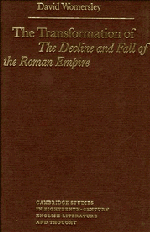Book contents
- Frontmatter
- Contents
- Acknowledgements
- A note on references and quotations
- Introduction
- PART I The historiography milieu
- PART II The Decline and Fall of the Roman Empire
- 3 Introduction
- Volume 1 - 1776
- Gibbon among the philosophers
- Volumes II and III - 1781
- Volumes IV, V and VI - 1788
- 13 ‘A dead uniformity of abject vices’
- 14 Structure
- 15 ‘Not a system, but a series’
- 16 ‘A keener glance’
- 17 Realising the past
- 18 ‘The wide and various prospect of desolation’
- Appendix
- Bibliography
- Index
17 - Realising the past
Published online by Cambridge University Press: 05 September 2013
- Frontmatter
- Contents
- Acknowledgements
- A note on references and quotations
- Introduction
- PART I The historiography milieu
- PART II The Decline and Fall of the Roman Empire
- 3 Introduction
- Volume 1 - 1776
- Gibbon among the philosophers
- Volumes II and III - 1781
- Volumes IV, V and VI - 1788
- 13 ‘A dead uniformity of abject vices’
- 14 Structure
- 15 ‘Not a system, but a series’
- 16 ‘A keener glance’
- 17 Realising the past
- 18 ‘The wide and various prospect of desolation’
- Appendix
- Bibliography
- Index
Summary
What thin partitions Sense from Thought divide
PopeIn An Essay on Criticism (1711) Pope humorously attends to some common errors of poetic taste and poetic composition:
But most by Numbers judge a Poet's Song,
And smooth or rough, with them, is right or wrong;
In the bright Muse tho' thousand Charms conspire,
Her Voice is all these tuneful Fools admire,
Who haunt Parnassus but to please their Ear,
Not mend their Minds; as some to Church repair,
Not for the Doctrine, but the Musick there.
These Equal Syllables alone require,
Tho' oft the Ear the open Vowels tire,
While Expletives their feeble Aid do join,
And ten low Words oft creep in one dull Line,
While they ring round the same unvary'd Chimes,
With sure Returns of still expected Rhymes.
Where-e'er you find the cooling Western Breeze,
In the next Line, it whispers thro' the Trees;
If Chrystal Streams with pleasing Murmurs creep,
The Reader's threaten'd (not in vain) with Sleep.
Then, at the last, and only Couplet fraught
With some unmeaning Thing they call a Thought,
A needless Alexandrine ends the Song,
That like a wounded Snake, drags its slow length along.
The repetition of the rhyme in the first and last couplets (song/wrong, song/along) seals off these lines from their surroundings and presents them as a distinct section of Pope's total argument in the Essay.
- Type
- Chapter
- Information
- The Transformation of The Decline and Fall of the Roman Empire , pp. 275 - 288Publisher: Cambridge University PressPrint publication year: 1988

